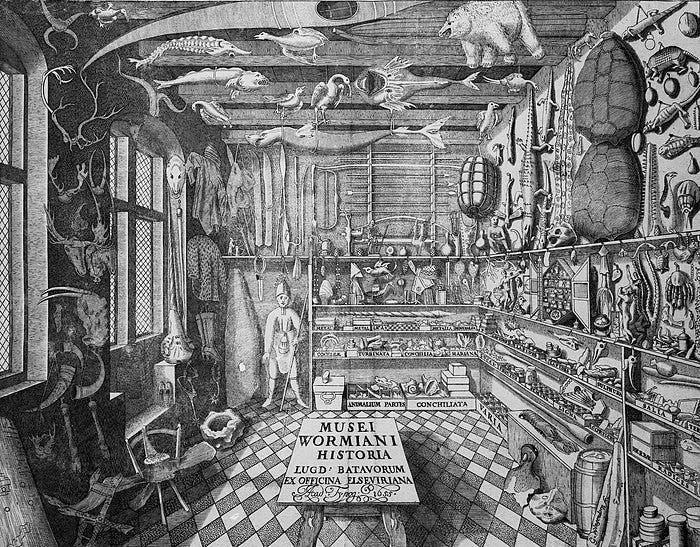I’m fascinated with Magic and Magicians. I think that both “Magic” and “Magicians” are two things that nearly everyone gets wrong and that that's because, while encountering a magician may be a frequent event, knowing that you did is not.
The reason that knowing you met a magician is not frequent, relative to how often you meet them, is that a magician is someone who works through whatever it is that you’re not tracking, either via actively directing your attention away from it, or, much more interesting, and relevant, by working through something you don’t even believe is a thing.
There’s an analogy here to cabinets of curiosities.
A cabinet of curiosities.
If you haven’t heard of them before, cabinets of curiosities were a trend for Renaissance Europe aristocrats where whenever in their travels they’d find an exotic object that didn’t fit into their ontology of the world, that didn’t fit into the categories that Renaissance Europe aristocrats would break the world into, they would, instead of stuffing it under a category, stuff them inside a room, that they could then use to brag about.
The way I think of magicians, actual magicians, is like living, breathing, cabinets of curiosities: they’re people who have been collecting skills that shouldn’t work, not according to our contemporary ontology of the world, but which do.
Now, don’t let names fool you: “magic” and “magicians” usually conjure images of certain skills —illusion, misdirection, decoys, tricks—and a certain aesthetic—the red curtain, and suit, and tophat of stage magic.
Illusion, tricks, and stage magic are precisely what I don’t mean when I say “magician”. I mean more like… irl wizards.
In fact, I hold a suspicion that the ‘reduction’ of magicians and magic to “stage magic” and to “illusions” and “tricks” is itself a decoy, to keep your attention misdirected from what’s actually going on.
My claim is—and I’m realizing as I write this that I can assert much more than what I can prove, that this writing will be most resonant with people who’ve had an encounter with what I’m talking about, that it won’t convince any skeptic, but that it will reassure someone who has that they’re not crazy—my claim is that a magician is someone who specializes in hacking your system.
My claim is that for all intents and purposes, you're a system, and a system can be hacked.
How?
Well, here’s some of the things I’ve seen personally magicians do:
A magician can notice how “expanded” or “closed” your awareness is, in real-time.
A magician can read your “lines of awareness” and move between them—think of the way spies in movies avoid lasers
A magician can read your “frame rate”—see how often you’re actually going from your thoughts back to your senses—and move through the frames you don’t have.
A magician can pattern interrupt you to disrupt your OODA loop making it so that compliance with their instructions feels like the most elegant thing to do.
A magician can very actively try to make you lose your mind, question your sanity, and implant beliefs in you.
A magician can get you to subordinate to them by manipulating words if you are subordinated to words and haven’t properly distinguished between words and things.
A magician can get you to subordinate to them by convincing you that’s the best way to fulfill your values
Now, what holds these skills together? I don’t think anything does, really, except that they’re things that shouldn’t be possible: it shouldn’t be possible to read someone's awareness in real-time, or “sensation frame-rate”, or to very casually and subtly disrupt their OODA loop, or get them to subordinate to you through words.
And precisely because we believe these things aren’t possible we don’t track them, which is why they can be used as a way to hack you, as a way to run “””magic””” on you.





Love this so so much. Many nuggets in this one.
Fantastic piece! A really crisp essay to give someone the intuition of "blindspots" and how they can get exploited.